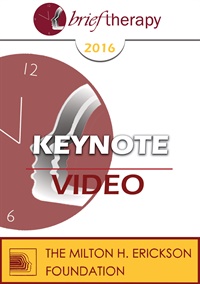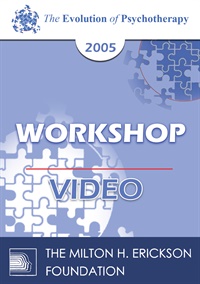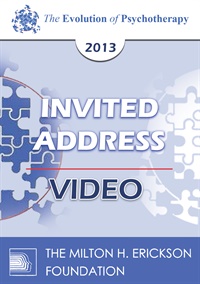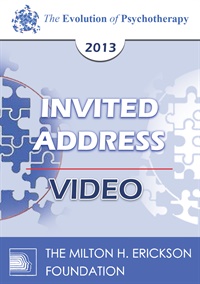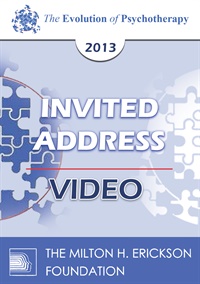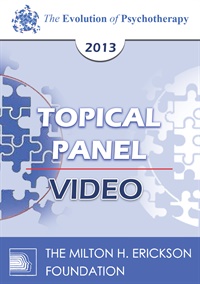
- Average Rating:
- Not yet rated
- Topic Areas:
- Dialogues | Brief Therapy | Research
- Categories:
- Brief Therapy Conference | Brief Therapy Conference 2002
- Faculty:
- Scott Miller, PhD | James Prochaska, PhD
- Duration:
- 58:14
- Format:
- Audio Only
- Original Program Date:
- Dec 13, 2002
- Short Description:
- BT02 Dialogue 10 - Research in Brief Therapy - Scott Miller, PhD and James Prochaska, PhD
- Price:
- $15.00 - Base Price

- Average Rating:
- Not yet rated
- Topic Areas:
- Workshops | Research | Brief Therapy | History of Psychotherapy | Psychotherapy
- Categories:
- Brief Therapy Conference | Brief Therapy Conference 2006
- Faculty:
- Scott Miller, PhD
- Duration:
- 2:03:53
- Format:
- Audio Only
- Original Program Date:
- Dec 07, 2006
- Short Description:
- At last count, over 400 separate models of psychotherapy have been found to exist (Garfield & Bergin, 1994). Despite the claims and promises made by the proponents of the various treatment models, 40 years of increasingly sophisticated outcome research has not found any one model or technique superior for the resolution of the problems that clients bring into treatment, Indeed, most of the research has only confirmed "common sense" (Frank 1993). In this workshop, forty years of outcome research will be translated into practical, common sense and empirically supported therapeutic skills that you can use for the efficient and effective resolution of the problems that clients bring to treatment.
- Price:
- $15.00 - Base Price
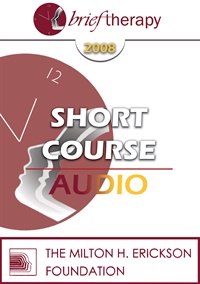
- Average Rating:
- Not yet rated
- Topic Areas:
- Short Courses | Brief Therapy | Meditation, Spirituality and Yoga | Research
- Categories:
- Brief Therapy Conference | Brief Therapy Conference 2008
- Faculty:
- Alexander Simpkins, PhD | Annellen M. Simpkins, PhD
- Duration:
- 1:25:19
- Format:
- Audio Only
- Original Program Date:
- Dec 11, 2008
- Short Description:
- Meditation offers useful and varied methods for brief therapy. Important scientific studies on meditation's neuroscience and clinical applications show many meditation methods are effective. Yoga, Buddhism, Daoism and Zen are described, each with its key concepts and unique approaches to mental development. Attendees learn research, theory and useful meditation methods step-by-step, including concentration, breathing, mindfulness, wu-wei, qi gong and zazen. Case examples form links to practice. Therapists will fine lasting solutions to enhance therapeutic work.
- Price:
- $15.00 - Base Price
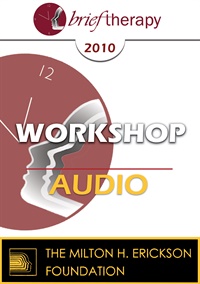
- Average Rating:
- Not yet rated
- Topic Areas:
- Workshops | Research | Therapist Development
- Categories:
- Brief Therapy Conference | Brief Therapy Conference 2010
- Faculty:
- Scott Miller, PhD
- Duration:
- 2:37:10
- Format:
- Audio Only
- Original Program Date:
- Dec 10, 2010
- Short Description:
- Without exception, developers and devotees to particular methods claim superiority in conceptualization and outcome of their chosen approach. Meanwhile, governmental bodies, professional organizations, and third party payers are assembling, mandating adherence, and in some instances limiting payment to lists of treatments considered “evidence-based. So, “what works?” The presenter will identify core factors responsible for therapeutic success regardless of theoretical orientation or psychiatric diagnosis. The research on “what works” will be carefully translated into practical, common sense, and empirically supported therapeutic skills that can be used for the efficient and effective resolution of problems clients bring to treatment.
- Price:
- $15.00 - Base Price
Tags: Therapist Development
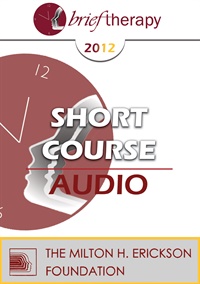
- Average Rating:
- Not yet rated
- Topic Areas:
- Short Courses | Brief Therapy | Research
- Categories:
- Brief Therapy Conference | Brief Therapy Conference 2012
- Faculty:
- Eva Long
- Duration:
- 1:18:46
- Format:
- Audio Only
- Original Program Date:
- Dec 09, 2012
- Short Description:
- BT12 Short Course 31 – Sustaining Passion and Longevity in Life Using Medical and Longevity Research and Theories in Brief Therapy – Eva Long, PhD This is a fast-paced, proven successful workshop on how professionals will help patients and clients utilizing the current adult development research/best practices in meaningful work/self-renewal with practical implementation ideas. This session will focus on the importance of 1) creating a life’s purpose, 2) optimism, 3) a circle of friends, 4) managing loss, and letting go while connecting the dots on some of the most significant medical and longevity research.
- Price:
- $15.00 - Base Price
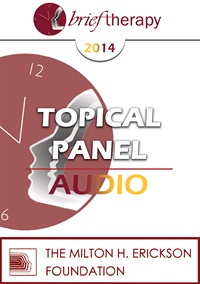
- Average Rating:
- Not yet rated
- Topic Areas:
- Psychotherapy | Topical Panels | Research
- Categories:
- Brief Therapy Conference | Brief Therapy Conference 2014
- Faculty:
- Scott Miller, PhD | Michael Yapko, PhD | Ernest Rossi, PhD
- Duration:
- 1:01:28
- Format:
- Audio Only
- Original Program Date:
- Dec 13, 2014
- Short Description:
- This panel dives into the evolving relationship between research and psychotherapy, confronting issues from antidepressant studies ghostwritten by pharma to landmark trials showing therapist skill outweighs treatment model. Through stories of media influence, policy debates, and clinical realities, participants see how conflicting findings ripple from the lab to the consulting room. The discussion underscores why translating research into meaningful practice—and training therapists to measure and reflect on outcomes—matters more than ever.
- Price:
- $15.00 - Base Price
- Average Rating:
- Not yet rated
- Topic Areas:
- Keynotes | Domestic Violence | Research | Abuse | Couples Therapy | Relationships
- Categories:
- Brief Therapy Conference | Brief Therapy Conference 2016
- Faculty:
- John Gottman, PhD | Julie Gottman, PhD
- Course Levels:
- Master Degree or Higher in Health-Related Field
- Duration:
- 1:41:28
- Format:
- Audio and Video
- Original Program Date:
- Dec 08, 2016
- Short Description:
- Drs. John and Julie Gottman will present a state-of-the-art review of how to conceptualize and treat the highly intractable problem of domestic violence toward intimate partners. They will review the research literature and present a conceptualization of the issues in treating this population. They will describe a highly successful randomized clinical trial study and the results that demonstrate long-term follow up effectiveness.
- Price:
-
Sale is $29.00
price reduced from Base Price - $59.00
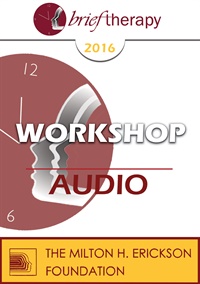
- Average Rating:
- Not yet rated
- Topic Areas:
- Workshops | Mind-Body | Research | Brief Therapy | Neuroscience
- Categories:
- Brief Therapy Conference | Brief Therapy Conference 2016
- Faculty:
- Ernest Rossi, PhD | Richard Hill, MBMSc, MEd, MA
- Duration:
- 2:21:47
- Format:
- Audio Only
- Original Program Date:
- Dec 11, 2016
- Short Description:
- We will review the little-known history of the MHE/Ravitz/Rossi research, which developed the first quantum electrodynamic field theory of therapeutic hypnosis from 1950 to 2016. We will use the STEM (Science, Technology, Engineering, and Math) perspective to plan, promote & publish research on MHE’s naturalistic hypnosis, consciousness, cognition & therapeutic states in Open Access High Impact Scientific Journals. Everyone is welcome to this first organizational meeting.
- Price:
- $15.00 - Base Price
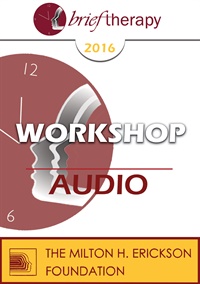
- Average Rating:
- Not yet rated
- Topic Areas:
- Workshops | Brief Therapy | Ericksonian Hypnosis and Therapy Techniques | Research | Therapist Development
- Categories:
- Brief Therapy Conference | Brief Therapy Conference 2016
- Faculty:
- Jeffrey Zeig, PhD
- Duration:
- 2:02:54
- Format:
- Audio Only
- Original Program Date:
- Dec 11, 2016
- Short Description:
- Skills and experience, research and theory ... each plays a central role in the development of effective therapy practice. And then there is something else. When we recall the work of such figures as Milton Erickson, Virginia Satir, and Carl Whitaker, we detect another layer: artistry. Surprisingly, artistry is something that can be taught, or more accurately, expanded. Everyone has the capacity. And it is artistry that brings forth all of that skill, experience, research and theory in effective and generative ways.
- Price:
- $15.00 - Base Price
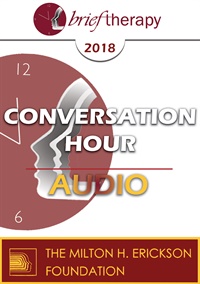
- Average Rating:
- Not yet rated
- Topic Areas:
- Great Conversations | Anxiety | Depression | Research | Training | Brief Therapy
- Categories:
- Brief Therapy Conference | Brief Therapy Conference 2018
- Faculty:
- Stephen Gilligan, PhD | Scott Miller, PhD
- Duration:
- 1:05:12
- Format:
- Audio Only
- Original Program Date:
- Dec 08, 2018
- Short Description:
- Therapists need theoretical and technical constructs, including those that are empirically based. Therapists need to understand how to create a comprehensive treatment plan.
- Price:
- $15.00 - Base Price
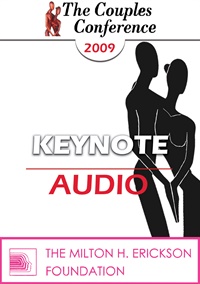
- Average Rating:
- Not yet rated
- Topic Areas:
- Keynotes | Couples Therapy | Relationships | Research
- Categories:
- Couples Conference | Couples Conference 2009
- Faculty:
- John Gottman, PhD
- Duration:
- 2:49:17
- Format:
- Audio Only
- Original Program Date:
- May 03, 2009
- Short Description:
- Drawing upon 36 years of systematic multi-method longitudinal research with couples, Dr. Gottman teaches the differences between successful and unsuccessful couples in dealing with conflict and fostering romance and harmony. Dr. Gottman provides the basic clinical skills needed to help couples improve their relationships.
- Price:
- $15.00 - Base Price
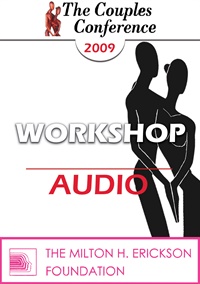
- Average Rating:
- Not yet rated
- Topic Areas:
- Workshops | Couples Therapy | Neuroscience | Research
- Categories:
- Couples Conference | Couples Conference 2009
- Faculty:
- Pat Love, EdD
- Duration:
- 1:22:34
- Format:
- Audio Only
- Original Program Date:
- May 01, 2009
- Short Description:
- Current research from the field of neurophysiology confirms the fact that permanent change involves treating the system as well as the symptom. Come learn a simple, yet impactful way to help couples break old patterns by forming new ones. Lecture, demonstration, video and experiential exercise will be used.
- Price:
- $15.00 - Base Price
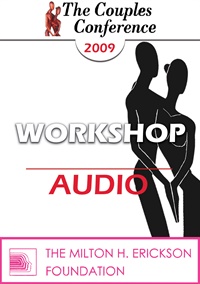
- Average Rating:
- Not yet rated
- Topic Areas:
- Workshops | Couples Therapy | Marriage | Relationships | Research
- Categories:
- Couples Conference | Couples Conference 2009
- Faculty:
- Pat Love, EdD
- Duration:
- 1:40:31
- Format:
- Audio Only
- Original Program Date:
- May 03, 2009
- Short Description:
- Several new studies have uncovered a seismatic shift that has taken place regarding the purpose and practice of marriage. These research findings explain many of the difficulties we face behind the therapy door. Come get a research update and clinical applications for couple's therapy. Lecture, video, handouts, discussion, demonstration will be utilized.
- Price:
- $15.00 - Base Price
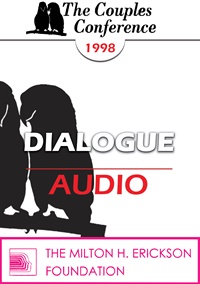
- Average Rating:
- Not yet rated
- Topic Areas:
- Dialogues | Research | Gottman Method | Couples Therapy | Psychotherapy
- Categories:
- Couples Conference 1998 | Couples Conference | Pioneers in Couples and Family Therapy
- Faculty:
- Ellyn Bader, PhD | John Gottman, PhD
- Duration:
- 57:13
- Format:
- Audio Only
- Original Program Date:
- Nov 07, 1998
- Short Description:
- A dynamic dialogue between two leading experts in couples therapy, examining the intersection of scientific research and clinical practice. Bader and Gottman debate the effectiveness of therapeutic techniques, particularly active listening, while highlighting the critical role of therapist skill, emotional intelligence, and nuanced interventions in helping distressed couples improve communication and connection.
- Price:
- $15.00 - Base Price
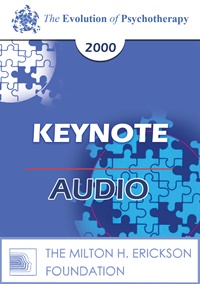
- Average Rating:
- Not yet rated
- Topic Areas:
- Keynotes | Social Psychology | Research | Communication | Motivation
- Categories:
- Evolution of Psychotherapy | Evolution of Psychotherapy 2000
- Faculty:
- Elliot Aronson, Ph.D.
- Duration:
- 1 Hour 3 Minutes
- Format:
- Audio Only
- Original Program Date:
- May 28, 2000
- Short Description:
- This talk brings social psychology to life through vivid, often surprising stories about how people talk themselves into change. Rather than relying on advice or persuasion, it shows how situations that evoke integrity, empathy, and personal responsibility can lead to lasting shifts in behavior. Therapists and students will find fresh ways to think about motivation, resistance, and change, with ideas that naturally echo many therapeutic moments in the consulting room.
- Price:
- $15.00 - Base Price
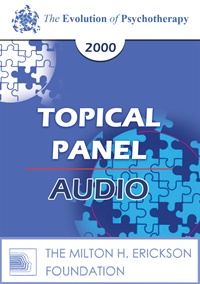
- Average Rating:
- Not yet rated
- Topic Areas:
- Topical Panels | Psychotherapy | Research
- Categories:
- Evolution of Psychotherapy | Evolution of Psychotherapy 2000
- Faculty:
- Albert Bandura | Aaron Beck, MD | Eugene Gendlin, PhD | Donald Meichenbaum, PhD
- Duration:
- 55 Minutes
- Format:
- Audio Only
- Original Program Date:
- May 27, 2000
- Short Description:
- This panel takes a candid, practical look at what psychotherapy research can and cannot tell us about change. Moving beyond simple outcome claims, the discussion examines how treatments work, what actually predicts improvement, and why process, alliance, context, and social impact matter alongside symptom reduction. The conversation challenges therapists to think more critically about evidence, ethics, prevention, and real-world effectiveness, especially with complex, high-risk, and underserved populations
- Price:
- $15.00 - Base Price
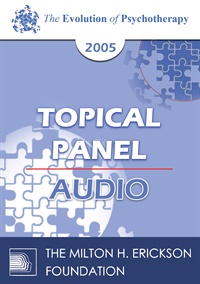
- Average Rating:
- Not yet rated
- Topic Areas:
- Topical Panels | Psychotherapy | Research
- Categories:
- Evolution of Psychotherapy | Evolution of Psychotherapy 2005
- Faculty:
- Albert Bandura | Marsha Linehan, PhD | Donald Meichenbaum, PhD | John Gottman, PhD
- Duration:
- 1 Hour 2 Minutes
- Format:
- Audio Only
- Original Program Date:
- Dec 09, 2005
- Short Description:
- This panel takes an candid look at psychotherapy research, asking not just what works, but how change actually holds up in real life. Drawing on couples research, suicide prevention, treatment development, and implementation science, the discussion wrestles with relapse, mechanisms of change, evidence-based practice, and the gap between research settings and everyday clinical work. Therapists and students are invited into a lively, unscripted conversation about data, judgment, ethics, and how research can genuinely serve both clients and society. Moderated by Jeffrey Kottler, PhD
- Price:
- $15.00 - Base Price
- Average Rating:
- Not yet rated
- Topic Areas:
- Workshops | Psychotherapy | Research | Therapist Development
- Categories:
- Evolution of Psychotherapy | Evolution of Psychotherapy 2005
- Faculty:
- Scott Miller, PhD
- Course Levels:
- Master Degree or Higher in Health-Related Field
- Duration:
- 1:50:53
- Format:
- Audio and Video
- Original Program Date:
- Dec 07, 2005
- Short Description:
- EP05 Workshop 05 - Partnering with Clients to Improve the Process and Outcome of Treatment - Scott Miller, Ph.D. Based on pioneering research into the curative factors associated with effective clinical work across treatment approaches and disciplines, participants will learn how to partner with clients to tailor treatment for maximum effect and efficiency. Miller also will present a simple, valid and reliable method for maximizing the effectiveness and efficiency of treatment based on client feedback about the process and outcome of treatment.
- Price:
-
Sale is $29.00
price reduced from Base Price - $59.00
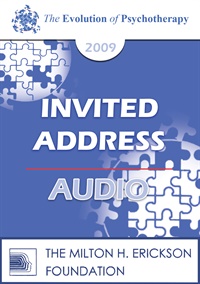
- Average Rating:
- Not yet rated
- Topic Areas:
- Invited Addresses | Psychotherapy | Motivation | Research
- Categories:
- Evolution of Psychotherapy | Evolution of Psychotherapy 2009
- Faculty:
- Albert Bandura
- Duration:
- 1 Hour 4 Minutes
- Format:
- Audio Only
- Original Program Date:
- Dec 12, 2009
- Short Description:
- This address traces how beliefs about personal agency shape motivation, resilience, emotional health, and the ability to change entrenched behavior. Drawing on decades of research, vivid clinical examples, and large-scale social interventions, it shows how self-efficacy is built through mastery, modeling, and meaningful action rather than insight alone. The talk moves fluidly from therapy rooms to global public health and social change, offering therapists and students a powerful framework for understanding how people learn to face fear, recover from setbacks, and reshape their lives and communities.
- Price:
- $15.00 - Base Price
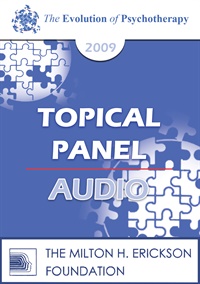
- Average Rating:
- Not yet rated
- Topic Areas:
- Psychotherapy | Topical Panels | Research
- Categories:
- Evolution of Psychotherapy | Evolution of Psychotherapy 2009
- Faculty:
- David Barlow, PhD | Steven Hayes, PhD | Scott Miller, PhD
- Duration:
- 1 Hour 2 Minutes
- Format:
- Audio Only
- Original Program Date:
- Dec 11, 2009
- Short Description:
- This panel takes a candid look at what psychotherapy research actually tells us about change, outcomes, and effectiveness. The discussion challenges diagnosis-driven models, questions whether specific techniques outperform others, and explores the roles of therapeutic alliance, client strengths, and trans-diagnostic processes. Participants are invited to rethink how therapy works, how progress should be measured, and what research means for real-world clinical practice and training.
- Price:
- $15.00 - Base Price
- Average Rating:
- Not yet rated
- Topic Areas:
- Trauma | Invited Addresses | Memory | Post-Traumatic Stress Disorder (PTSD) | Psychotherapy | Research
- Categories:
- Evolution of Psychotherapy | Evolution of Psychotherapy 2013
- Faculty:
- Bessel van der Kolk, MD
- Course Levels:
- Master Degree or Higher in Health-Related Field
- Duration:
- 52:44
- Format:
- Audio and Video
- Original Program Date:
- Dec 13, 2013
- Short Description:
- This workshop explores how trauma affects people’s rhythms within themselves and with their surroundings. Trauma changes the way the brain processes information and how the human organism engages with the world. Because of biological systems that are altered in a use-dependent manner traumatized people continue to react in myriad ways to current experience as a replay of the past.
- Price:
-
Sale is $29.00
price reduced from Base Price - $59.00
- Average Rating:
- Not yet rated
- Topic Areas:
- Invited Addresses | Suicide | Psychotherapy | Research
- Categories:
- Evolution of Psychotherapy | Evolution of Psychotherapy 2013
- Faculty:
- Marsha Linehan, PhD
- Course Levels:
- Master Degree or Higher in Health-Related Field
- Duration:
- 57:21
- Format:
- Audio and Video
- Original Program Date:
- Dec 13, 2013
- Short Description:
- There is no area of research that brings a complex array of ethical issues into sharp focus more than conducting treatment trials when the focus is on decreasing suicidal behavior and preventing suicide. Historically, suicidal individuals have been excluded from treatment studies because their inclusion was thought to be unethical, unsafe or too difficult to manage clinically. This presentation will discuss where the field of suicide intervention research started, the successes and failures we have encountered thus far, as well as the critical issues that still need to be addressed in order to move the field forward.
- Price:
-
Sale is $29.00
price reduced from Base Price - $59.00
Tags: Suicide Psychotherapy Research
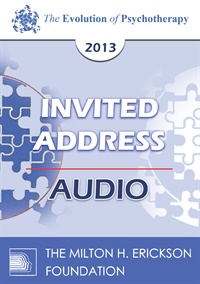
- Average Rating:
- Not yet rated
- Topic Areas:
- Invited Addresses | Psychotherapy | Research
- Categories:
- Evolution of Psychotherapy | Evolution of Psychotherapy 2013
- Faculty:
- David Barlow, PhD
- Duration:
- 58:07
- Format:
- Audio Only
- Original Program Date:
- Dec 14, 2013
- Short Description:
- Dr. Barlow reflects on the evolution of evidence-based psychotherapy and the challenges of translating research into everyday clinical care. The session examines what decades of outcome research reveal about psychological treatments, why effective therapies often remain underused, and how policy, training, and delivery systems shape what clients actually receive. Participants are encouraged to think beyond therapy “schools” toward principle-driven, transdiagnostic approaches and broader public-health models for expanding access to effective care.
- Price:
- $15.00 - Base Price
- Average Rating:
- Not yet rated
- Topic Areas:
- Invited Addresses | Psychotherapy | Research | Resistance | Motivation
- Categories:
- Evolution of Psychotherapy | Evolution of Psychotherapy 2013
- Faculty:
- David Burns, MD
- Course Levels:
- Master Degree or Higher in Health-Related Field
- Duration:
- 59:00
- Format:
- Audio and Video
- Original Program Date:
- Dec 14, 2013
- Short Description:
- New research indicates that motivation influences how we think, feel, and behave, as much as cognitions, and that the failure to address resistance is the cause of most therapeutic failure. Dr. Burns will describe the eight most common forms of resistance and present powerful new techniques to melt away resistance before using any cognitive, behavioral, or interpersonal techniques.
- Price:
-
Sale is $29.00
price reduced from Base Price - $59.00
- Average Rating:
- Not yet rated
- Topic Areas:
- Psychotherapy | Topical Panels | Research
- Categories:
- Evolution of Psychotherapy | Evolution of Psychotherapy 2013
- Faculty:
- David Barlow, PhD | Steven Hayes, PhD | Scott Miller, PhD
- Course Levels:
- Master Degree or Higher in Health-Related Field
- Duration:
- 59:47
- Format:
- Audio and Video
- Original Program Date:
- Dec 14, 2013
- Short Description:
- This panel explores where psychotherapy research is headed as the field moves beyond rigid treatment packages toward understanding what actually drives change. Participants engage with questions about process-based evidence, therapist effects, client engagement, and how flexibility, values, and deliberate practice shape outcomes across approaches. The discussion offers a grounded, sometimes provocative look at how research can better support real clinical decision-making without losing sight of complexity, context, and the therapist’s role in the room.
- Price:
-
Sale is $29.00
price reduced from Base Price - $59.00


